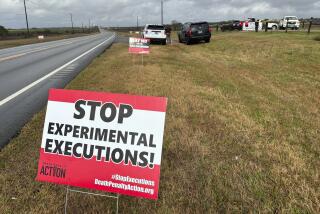High court to hear lethal injection case
The Supreme Court said Tuesday it would hear a new challenge to the way states carry out executions by lethal injection, possibly banning outdated chemical concoctions that may cause dying inmates excruciating pain.
Such a ruling would not prohibit lethal injections, but it could force officials in most states to use new or different chemicals so inmates are not subjected to an “unnecessary risk of pain and suffering.”
This probably would not have much effect in California. In December, U.S. District Judge Jeremy Fogel in San Jose blocked the state from carrying out executions using the older chemical concoction on the grounds it would cause an unnecessary risk of a painful death.
In July, lawyers for two Kentucky death row inmates appealed to the Supreme Court and cited Fogel’s ruling. They urged the justices to adopt the “unnecessary risk” rule as a constitutional standard for deciding what is “cruel and unusual punishment.”
In a brief order Tuesday, the justices said they had voted to hear this claim early next year. The court’s intervention may halt some pending executions until the question is resolved, although authorities in Texas, the nation’s busiest death penalty state, said the announcement would not affect its execution docket.
Texas executed an inmate Tuesday night and has another execution set for Thursday.
When capital punishment was upheld as constitutional more than 30 years ago, states relied on electrocution, the gas chamber, hanging or the firing squad to put an inmate to death. Lethal injections were introduced in the 1980s as a new and supposedly painless method of execution. Today, 37 of the 38 states with the death penalty have adopted this method. Nebraska still relies on electrocution.
In recent years, new medical evidence has suggested that the commonly used three-chemical compound of sodium thiopental, pancuronium bromide and potassium chloride may be anything but painless. Some experts say that, while pancuronium bromide may paralyze the inmate, potassium chloride causes intense pain while stopping the heart.
This evidence has been brought before judges across the country, prompting some of them to halt executions.
The Kentucky Supreme Court was unconvinced, however. Its judges said they did not see proof of a “substantial risk of wanton and unnecessary pain,” and based on that legal standard it upheld the continued use of the three-chemical concoction.
Kentucky has had only two executions in recent decades, although it has 41 inmates who are under a death sentence.
Nonetheless, David M. Barron, a 29-year-old public defender from Frankfort, Ky., wrote an appeal to the Supreme Court and recommended the justices set a national rule for deciding what constitutes “cruel and unusual punishment” in evaluating a method of execution.
The state’s lawyers replied that the two inmates were good candidates for the death penalty. In 1992, Ralph Baze shot and killed two county sheriffs who had come to arrest him on a felony warrant from Ohio.
The other inmate, Thomas Clyde Bowling Jr., shot and killed a mother and father in 1990 after his car had crashed into theirs.
“This is not a case for the U.S. Supreme Court to tell the states how to carry out an execution or what chemicals to use,” Barron said in an interview Tuesday. “Rather it is for the justices to articulate the proper legal standard and whether what is being done complies with that.” If it doesn’t, how to fix it would be left to the states, he said.
Barron said there was ample evidence that other chemicals would be less painful than the current trio used by three dozen states, including California.
Since Fogel’s ruling, California has retooled its protocol for carrying out executions and state officials are in the process of building a new death chamber. Fogel has scheduled a December hearing to assess whether the new procedures pass constitutional muster.
The high court’s action Tuesday will reverberate around the nation.
University of Richmond law professor Carl Tobias said a key issue is looming well before the court hears the case: what will happen with executions scheduled before the court rules.
“I assume most states will await the Supreme Court ruling, but there may be pressure not to wait,” Tobias said.
Ty Alper, associate director of the death penalty clinic at UC Berkeley’s Boalt Hall School of Law, who maintains the website lethalinjection.org, said he expected the high court’s ruling to affect every pending lethal injection challenge, but certainly would not lead to the abolition of lethal injection.
He emphasized that in recent years stays of execution stemming from lethal injection challenges had been granted in some cases and denied in others “with no meaningful difference between the substance of the cases.”
“I think it has finally sunk in that there are arbitrary differences between how these cases are being treated in the lower courts” and that there is a need for a uniform standard on what constitutes cruel and unusual punishment in these circumstances, Alper said.
Savage reported from Washington and Weinstein from Los Angeles.
More to Read
Start your day right
Sign up for Essential California for news, features and recommendations from the L.A. Times and beyond in your inbox six days a week.
You may occasionally receive promotional content from the Los Angeles Times.







